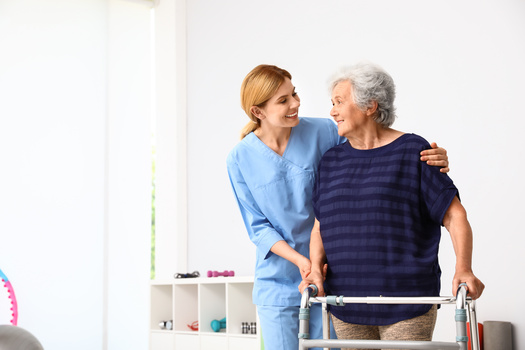Joint replacement recovery can be a long, challenging process. For the first few days after the surgery, your aging loved one will be in pain and will need help performing daily tasks. Once the hardest part is over, you still need to provide the emotional and physical support your loved one needs to make a speedy recovery. Here are five ways to make your loved one’s recovery easier.
1. Get the House Ready for Recovery
Before your loved one arrives home, rearrange the living environment for optimal recovery. If your loved one usually sleeps on the second floor, create a comfortable sleeping area on the ground floor. If the doctor has provided a list of post-op essentials like prescriptions, bandages, and ice packs, make sure they’re all purchased before your loved one gets home. Consider comfort as well. Equip the designated recovery room with pillows and clean linens, and find clothing and shoes that won’t constrain your loved one as he or she recovers.
If your senior loved one needs help managing an illness or assistance with daily tasks, make sure you choose a top-rated provider of senior care. Home Care Assistance is here to help your loved one live a happier and healthier life in the golden years. From the mentally stimulating activities in our Cognitive Therapeutics Method to our friendly Care Managers who are available to answer your questions 24 hours a day, we offer a wide array of high-quality at-home care services.
2. Provide Transportation
When seniors have hip or knee replacement surgery, they’re often unable to drive for weeks after the surgery. Provide transportation on the day of the surgery, to all follow-up appointments, and to physical therapy sessions. If you’re unavailable, arrange transportation with a friend or family member. Your loved one shouldn’t have to fret about finding a ride right after having surgery.
3. Help with Hygiene
For the first few weeks after surgery, your loved one may need help with basic hygiene tasks, and he or she may have difficulty using the shower or toilet independently. Because seniors have limited range of motion while recovering from joint replacement surgery, they may also have difficulty dressing themselves, tying their shoes, and managing other basic grooming tasks. Assist your loved one whenever necessary. If the recovery period is the first time your loved one has needed help with hygiene, approach the situation with sympathy.
If your aging loved one needs occasional help with bathing, grooming, cooking, or other basic household tasks, or if you need time to attend to important personal matters, reach out to Home Care Assistance, a leading provider of live-in and respite care. Barrie seniors can maintain their independence while living at home with the help of our reliable respite caregivers.
4. Manage Medications & Care for Wounds
After the surgery, your loved one will have to follow a post-op medication regimen and may be prescribed antibiotics, pain medications, and other medications that aid the recovery process. Oversee your loved one’s daily medication routine, making sure he or she takes the correct dosage at the correct time. You may also need to help with wound care, which could involve checking the surgical site for infections or irregularities and changing the dressing when needed. If you’ve never dressed a wound before, you may want to ask the doctor for tips.
5. Assist with Exercise
After joint replacement procedures, most seniors are prescribed some type of physical therapy. Older adults may need assistance from licensed physical therapists, or they may simply need to walk for a set time every day post-surgery. Whatever exercise regimen is recommended, help your loved one make physical progress by motivating him or her, holding his or her hand on daily walks around the block, or driving him or her to physical therapy sessions.
Families who have difficulty caring for loved ones after joint replacement surgery should consider hiring professional caregivers. Barrie at-home care experts are available to provide high-quality care to seniors on an as-needed basis. From assistance with mobility and exercise to providing transportation to the doctor’s office and social events, there are a variety of ways professional caregivers can help your aging loved one continue to live independently. If your loved one needs professional care, Home Care Assistance is here to help. To hire a compassionate, dedicated caregiver, call us at 647-970-3803 today.
